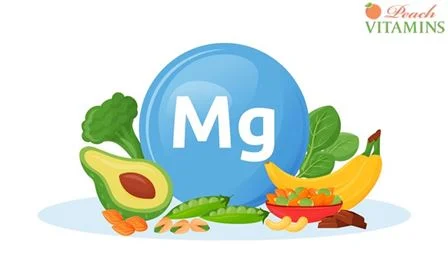Magnesium deficiency symptoms in women include fatigue, muscle cramps, insomnia, depression, anxiety, irritability, headaches, and even heart palpitations.
Magnesium is essential for over 300 biochemical reactions in our bodies. Without magnesium, our muscles would seize up, our hearts would stop, and our brains would shut down.
If you suspect you may have low magnesium levels, read on. I’ll tell you everything you need to know about magnesium deficiency symptoms in women.

What Are The 10 Signs Of Low Magnesium?
The role of magnesium per day is approximately 400mg, and this includes dietary intake, supplements, and excretion. If your diet contains less than 100mg of magnesium per day, then it’s likely that you’re deficient.
Symptoms of low magnesium are:
- Muscle Cramps – A common symptom of low magnesium is muscle cramping. These cramps usually occur after exercise but can also happen at rest, and they can be painful and last anywhere from minutes to hours.
- Seizures – Seizures are caused by abnormal electrical activity in the brain. When this happens, the person loses consciousness.
- Heart Palpitations – Heart palpitations are when the heart beats rapidly. This can cause dizziness, fainting, shortness of breath, chest pain, nausea, vomiting, and lightheadedness.
- Nervous System Problems – Nervous system problems include tremors, twitching, and jerking movements.
- Depression – Depressed moods are daily among those deficient in magnesium. People with low magnesium tend to feel tired, lazy, and unmotivated.
- Anxiety – Anxiety is another common problem associated with low magnesium.
- Insomnia – Insomnia is a condition where people don’t get enough sleep.
- Fatigue – Fatigue is one of the most common symptoms of low magnesium.
- Headaches – Headaches are common among those who have low magnesium.
- Migraine – Migraines are severe headaches that affect the head. They can last anywhere from 4-72 hours.
If these symptoms sound familiar, it may be time to talk to your doctor about getting tested for low magnesium.
Symptomatic Hypomagnesaemia
Hypomagnesaemia is a condition where there is too little magnesium in the body. This results in symptoms including muscle cramps, fatigue, nausea, vomiting, constipation, diarrhea, confusion, irritability, depression, seizures, heart arrhythmias, and death.
Women are at greater risk than men due to lower than average magnesium intake and reduced magnesium absorption from food sources. Magnesium deficiency may occur during pregnancy, lactation, menstruation, and after menopause.
Symptoms include muscle cramps, fatigue and weakness, nausea, vomiting, diarrhea, constipation, confusion, irritability, and depression. The most common cause of hypomagnesemia in women is inadequate dietary intake.
Other causes include excessive alcohol consumption, kidney disease, diabetes mellitus, liver cirrhosis, and certain medications (e.g., diuretics).
Magnesium supplementation has been shown to improve mood, reduce anxiety, relieve pain, prevent migraines, and help control blood pressure. Magnesium is essential for maintaining normal nerve function, regulating calcium metabolism, and assisting muscles to contract properly.
Magnesium is found in many foods, including whole grains, nuts, seeds, beans, leafy greens, bananas, avocados, fish, poultry, eggs, milk, cheese, yogurt, and dark chocolate. However, only 10% of Americans consume adequate amounts of magnesium each day. Women need approximately 420 mg daily; men should aim for 360 mg daily.
If you suspect you’re deficient in magnesium, talk to your doctor. They can test your serum magnesium level and recommend supplements accordingly.

Triglyceride-Rich Lipoproteins
Low-density lipoprotein (LDL) cholesterol is often called bad cholesterol because it increases the risk of heart disease. However, there is another type of LDL cholesterol called triglyceride-rich lipoproteins (TRLP).
TRLP has been shown to reduce inflammation and oxidative stress, which may help prevent cardiovascular diseases.
A healthy adult with magnesium deficiency symptoms tends to have lower levels of TRLP than women without. Magnesium deficiency symptoms include fatigue, muscle cramps, constipation, headaches, depression, anxiety, irritability, insomnia, memory loss, and poor concentration.
To determine whether you have magnesium deficiency symptoms, take a blood test to measure your total serum magnesium level.
If you have magnesium deficiency symptoms and your total serum magnesium level is below 0.7 mg/dL, consider taking supplemental magnesium daily. To avoid side effects, take 200 – 400 mg of magnesium daily.
Magnesium-Deficient Diet
If you’re a woman diagnosed with magnesium deficiency symptoms, you may not realize that you’ve been eating a magnesium-deficient diet.
Magnesium is one of the most essential minerals in our bodies. It helps regulate many functions, including muscle contraction, nerve function, blood pressure, heart rhythm, bone growth, and immune system response.
Women need more magnesium than men. This is because women produce less estrogen than men, and estrogen increases the absorption of calcium and decreases the absorption of magnesium. So, if you’re a female, you should eat magnesium-rich foods.
There are several ways to determine whether you’re consuming enough magnesium. The easiest way is to test your urine for signs of magnesium deficiency. Urine testing kits are available at drugstores.
Hypertensive adults who have high blood pressure tend to be magnesium deficient. If you’re experiencing hypertension, check your dietary intake of magnesium, and you may want to supplement with 500 mg of elemental magnesium daily.
Another way to tell if you’re getting enough magnesium is to keep track of your food intake. Foods rich in magnesium include leafy greens, nuts, seeds, beans, whole grains, fish, and yogurt.

Treatment of Hypertension
Hypertension is a condition where blood pressure is too high. High blood pressure causes damage to the heart, brain, eyes, kidneys, and many other organs.
There are two main types of hypertension: primary (essential) hypertension and secondary (nonspecific) hypertension. Primary hypertension occurs when there is no identifiable cause for elevated blood pressure.
Secondary hypertension results from other medical problems, such as kidney disease, thyroid problems, or adrenal gland dysfunction.
Primary hypertension usually begins during adulthood, although children may develop essential hypertension at any age. The most common symptoms include headaches, dizziness, fatigue, chest pain, shortness of breath, nausea, vomiting, blurred vision, and fainting.
Secondary hypertension often develops after menopause, pregnancy, or surgery. Women who experience these conditions should consult their doctor before taking supplements.
If you’re experiencing any of the above symptoms, talk to your doctor about possible treatments. Magnesium deficiency is one of the leading causes of hypertension.
Supplementing with magnesium helps lower blood pressure and reduce risk factors associated with cardiovascular diseases. Magnesium supplementation has been shown to improve sleep quality, relieve stress, and help prevent migraines.
Magnesium is available in liquid form over the counter, making it convenient for daily consumption. However, some doctors recommend supplementing with magnesium through food sources instead of liquids.
This allows the body to absorb the nutrients better and avoid side effects.
Cardiac Arrhythmias
Women who suffer from cardiac arrhythmia often experience palpitations (irregular heartbeats), shortness of breath, dizziness, fainting, chest pain, nausea, vomiting, weakness, fatigue, and lightheadedness. These symptoms may occur at any age, but women are most susceptible during menopause.
Many women suffering from these symptoms are unaware that they have a severe condition called hypomagnesemia. Magnesium is one of the most essential minerals in our body. It helps regulate electrical impulses in the heart, nerves, muscles, and brain.
When we lack sufficient amounts of magnesium, our hearts beat irregularly. This causes us to feel tired, weak, and anxious. We may also develop chest pains, headaches, and difficulty breathing.

Are Bananas High In Magnesium?
Bananas are one of the most popular fruits in the world. They’re delicious, nutritious, and packed with potassium, vitamin B6, fiber, and magnesium. But did you know bananas are also high in magnesium?
According to the USDA National Nutrient Database, bananas contain 0.5 mg/100 g of magnesium, meaning that 100 grams contain 5 mg of magnesium.
That’s not bad, considering bananas are only 90 calories per banana. And according to the American Dietetic Association, women need 420 mg of magnesium daily. So eating just two bananas every day would quickly meet your daily requirement.
But there’s another reason why bananas are great for your health. According to the International Journal of Food Sciences & Nutrition, bananas may help prevent heart disease.
The journal found that bananas were among the top foods containing antioxidants. Antioxidants protect cells from damage caused by free radicals, and free radicals cause cell damage and contribute to diseases such as cancer and cardiovascular disease.
Glucose Levels
Women who suffer from magnesium deficiency often experience elevated blood glucose levels. This happens because magnesium helps regulate insulin production and release. Insulin is responsible for transporting glucose (or blood sugar) out of the bloodstream and into cells, which can be used for energy.
When there isn’t enough magnesium available, insulin becomes overactive, which causes blood glucose levels to rise. The result is fatigue, irritability, mood swings, headaches, muscle cramps, and insomnia.
If you’re a woman suffering from these symptoms, you may need to supplement with magnesium. Magnesium supplements can help lower blood glucose levels and prevent future problems.
What Drink Has A Lot Of Magnesium?
If you’re looking for a drink with a lot of magnesium, try water, which has more magnesium per ounce than any other beverage.
Water is also the only food that contains no calories. So drinking plenty of water helps you lose weight. And since water doesn’t contain caffeine, alcohol, or sugar, it won’t cause headaches, jitters, or cravings.
But there’s one problem with drinking too much water. Your body can absorb only so much at once, and the rest passes through. To avoid dehydration, drink enough water to replace the amount lost daily.
That means drinking eight glasses of water every day. But if you’re not used to drinking that much water, you may feel thirsty.
To help you stay hydrated, here are some tips:
- Drink water before meals. This helps prevent hunger pangs later.
- Keep a bottle of water next to your bed.
How Quickly Does Magnesium Work?
Within 30 minutes after consuming magnesium, you should feel better.
Next, let’s talk about the length of time that magnesium lasts. This depends on several factors, including the type of supplement you take, how many times per day you consume it, and how fast you absorb it.
Finally, let’s discuss the possible side effects of taking too much magnesium. No known adverse side effects are associated with taking enough magnesium; however, some individuals may experience diarrhea, nausea, vomiting, constipation, and tingling sensations.
In summary, magnesium works quickly, lasts relatively long periods and has little to no known adverse side effects. So go ahead and try out one of these magnesium supplements today!

What Happens If Your Magnesium Is Too High?
If your magnesium level is too high, you may experience some unpleasant side effects. These include muscle cramps, fatigue, irritability, depression, anxiety, insomnia, headaches, heart palpitations, and nausea.
These symptoms usually go away after you lower your magnesium intake. However, if you consume large amounts of magnesium, you may develop kidney stones.
This is because magnesium is excreted through urine. So, if you’re drinking too much magnesium, your body will try to eliminate it through urination.
This is why keeping your magnesium intake within healthy limits is essential.
Final Thoughts
Magnesium deficiency symptoms in females are common. They include tremors, poor coordination, muscle cramps, loss of appetite, mood swings, personality changes, and night blindness.
Women who suffer from these symptoms may benefit from magnesium supplementation. Magnesium supplements can be taken orally or by injection.
The best way to get adequate magnesium is through diet.
However, if you don’t eat well, you must consider taking magnesium supplements. Magnesium supplements come in liquid and tablet forms, and liquid forms are more convenient than tablets.
So, if you want to improve your health, schedule a consultation with Ayurvedic practitioner Cosmic Mike to learn more about your levels of magnesium. You’ll see results soon!
